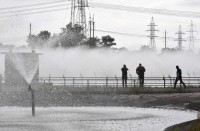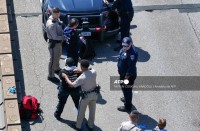Brazilian riot police on Tuesday (January 12) fired tear gas and stun grenades to disperse further protests over a rise in public transport fares in the country’s largest city, Sao Paulo.
Local media reported that some protesters threw stones and rocks at the police.
Student protester, Heber Velozo, who suffered head injuries in the clashes, said the police were attacking peaceful demonstrators.
“The police do not know how to work, they are not prepared. We were not doing anything, I was attacked with a book in my hand, not a stone, not a bomb, a book,” said Velozo.
Many Sao Paulo residents have been angered by the increase in public transport prices, with inflation in Brazil already running at more than 10 percent.
More than 1.5 million Brazilians lost their jobs last year through November, as Latin America’s largest economy fell deeper into its worst recession in more than 25 years.
Public transport users are also angry at the low quality of services, despite yearly fare increases.
“The demonstration is in protest against the fare increase from 3.50 reais to 3.80, which is a real abuse in light of the bad quality of public transport, there are always problems, strikes by metro and train workers, overcrowding on buses, trains, metros, so we are here calling for greater quality in public transport,” said Alex Minouro, holding a banner calling for the state to pay for fares in the name of the “Free Pass” movement.
Police also clashed with protesters in Sao Paulo and Rio de Janeiro last Friday. Television images showed protesters smashing the windows of buses in both cities, as well as and vandalizing bank agencies in Sao Paulo, and spray painting buses in Rio. Tear gas and stun grenades were also used.
The scenes evoked protests that swept Brazil in 2013, sparked by anger over bus fare increases during public spending on the FIFA World Cup, that brought hundreds of thousands of people onto the streets.
The latest demonstrations come as left-leaning President Dilma Rousseff, whose popularity has been crushed by the recession and a sweeping anti-corruption investigation that has ensnared her ruling coalition, faces impeachment proceedings in Congress.
Some political analysts say the mood on the streets toward her government could play an important role in determining the outcome of the impeachment process. (Reuters)







